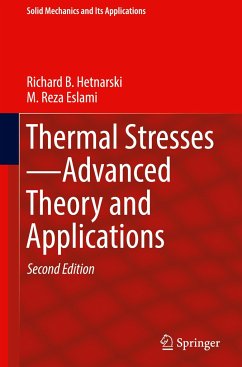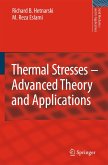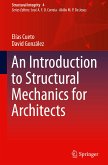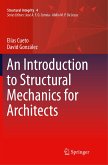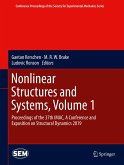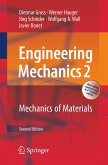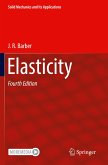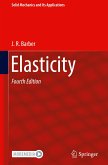- Gebundenes Buch
- Merkliste
- Auf die Merkliste
- Bewerten Bewerten
- Teilen
- Produkt teilen
- Produkterinnerung
- Produkterinnerung
This is an advanced modern textbook on thermal stresses. It serves a wide range of readers, in particular, graduate and postgraduate students, scientists, researchers in various industrial and government institutes, and engineers working in mechanical, civil, and aerospace engineering.
This volume covers diverse areas of applied mathematics, continuum mechanics, stress analysis, and mechanical design. This work treats a number of topics not presented in other books on thermal stresses, for example: theory of coupled and generalized thermoelasticity, finite and boundary element method in…mehr
Andere Kunden interessierten sich auch für
![Thermal Stresses -- Advanced Theory and Applications Thermal Stresses -- Advanced Theory and Applications]() Richard B. HetnarskiThermal Stresses -- Advanced Theory and Applications75,99 €
Richard B. HetnarskiThermal Stresses -- Advanced Theory and Applications75,99 €![An Introduction to Structural Mechanics for Architects An Introduction to Structural Mechanics for Architects]() Elías CuetoAn Introduction to Structural Mechanics for Architects59,99 €
Elías CuetoAn Introduction to Structural Mechanics for Architects59,99 €![An Introduction to Structural Mechanics for Architects An Introduction to Structural Mechanics for Architects]() Elías CuetoAn Introduction to Structural Mechanics for Architects59,99 €
Elías CuetoAn Introduction to Structural Mechanics for Architects59,99 €![Nonlinear Structures and Systems, Volume 1 Nonlinear Structures and Systems, Volume 1]() Nonlinear Structures and Systems, Volume 1148,99 €
Nonlinear Structures and Systems, Volume 1148,99 €![Engineering Mechanics 2 Engineering Mechanics 2]() Dietmar GrossEngineering Mechanics 255,99 €
Dietmar GrossEngineering Mechanics 255,99 €![Elasticity Elasticity]() J. R. BarberElasticity74,99 €
J. R. BarberElasticity74,99 €![Elasticity Elasticity]() J. R. BarberElasticity106,99 €
J. R. BarberElasticity106,99 €-
-
-
This is an advanced modern textbook on thermal stresses. It serves a wide range of readers, in particular, graduate and postgraduate students, scientists, researchers in various industrial and government institutes, and engineers working in mechanical, civil, and aerospace engineering.
This volume covers diverse areas of applied mathematics, continuum mechanics, stress analysis, and mechanical design. This work treats a number of topics not presented in other books on thermal stresses, for example: theory of coupled and generalized thermoelasticity, finite and boundary element method in generalized thermoelasticity, thermal stresses in functionally graded structures, and thermal expansions of piping systems.
The book starts from basic concepts and principles, and these are developed to more advanced levels as the text progresses. Nevertheless, some basic knowledge on the part of the reader is expected in classical mechanics, stress analysis, andmathematics, including vector and cartesian tensor analysis.
This 2nd enhanced edition includes a new chapter on Thermally Induced Vibrations. The method of stiffness is added to Chapter 7. The variational principle for the Green-Lindsay and Green-Naghdi models have been added to Chapter 2 and equations of motion and compatibility equations in spherical coordinates to Chapter 3. Additional problems at the end of chapters were added.
This volume covers diverse areas of applied mathematics, continuum mechanics, stress analysis, and mechanical design. This work treats a number of topics not presented in other books on thermal stresses, for example: theory of coupled and generalized thermoelasticity, finite and boundary element method in generalized thermoelasticity, thermal stresses in functionally graded structures, and thermal expansions of piping systems.
The book starts from basic concepts and principles, and these are developed to more advanced levels as the text progresses. Nevertheless, some basic knowledge on the part of the reader is expected in classical mechanics, stress analysis, andmathematics, including vector and cartesian tensor analysis.
This 2nd enhanced edition includes a new chapter on Thermally Induced Vibrations. The method of stiffness is added to Chapter 7. The variational principle for the Green-Lindsay and Green-Naghdi models have been added to Chapter 2 and equations of motion and compatibility equations in spherical coordinates to Chapter 3. Additional problems at the end of chapters were added.
Produktdetails
- Produktdetails
- Solid Mechanics and Its Applications 158
- Verlag: Springer / Springer International Publishing / Springer, Berlin
- Artikelnr. des Verlages: 978-3-030-10435-1
- 2. Aufl.
- Seitenzahl: 668
- Erscheinungstermin: 3. Mai 2019
- Englisch
- Abmessung: 241mm x 160mm x 39mm
- Gewicht: 1238g
- ISBN-13: 9783030104351
- ISBN-10: 3030104354
- Artikelnr.: 54561814
- Herstellerkennzeichnung Die Herstellerinformationen sind derzeit nicht verfügbar.
- Solid Mechanics and Its Applications 158
- Verlag: Springer / Springer International Publishing / Springer, Berlin
- Artikelnr. des Verlages: 978-3-030-10435-1
- 2. Aufl.
- Seitenzahl: 668
- Erscheinungstermin: 3. Mai 2019
- Englisch
- Abmessung: 241mm x 160mm x 39mm
- Gewicht: 1238g
- ISBN-13: 9783030104351
- ISBN-10: 3030104354
- Artikelnr.: 54561814
- Herstellerkennzeichnung Die Herstellerinformationen sind derzeit nicht verfügbar.
Dr. Richard B. Hetnarski is Professor Emeritus of the Department of Mechanical Engineering at the Rochester Institute of Technology. Mohammad Reza Eslami is Professor at the Mechanical Engineering Department of the Amirkabir University of Technology (Tehran Polytechnic), in Iran.
Chapter 1: Basic Laws of Thermoelasticity.- 1 Introduction.- 2 Stresses and Tractions.- 3 Equations of Motion.- 4 Coordinate Transformation. Principal Axes.- 5 Principal Stresses and Stress Invariants.- 6 Displacement and Strain Tensor.- 7 Compatibility Equations. Simply Connected Region.- 8 Compatibility Conditions. Multiply Connected Regions.- 9 Constitutive Laws of Linear Thermoelasticity.- 10 Displacement Formulation of Thermoelasticity.- 11 Stress Formulation of Thermoelasticity.- 12 Two-Dimensional Thermoelasticity.- 13 Michell Conditions.- 14 Problems.- Chapter 2: Thermodynamics of Elastic Continuum.- 1 Introduction.- 2 Thermodynamics Definitions.- 3 First Law of Thermodynamics.- 4 Second Law of Thermodynamics.- 5 Variational Formulation of Thermodynamics.- 6 Thermodynamics of Elastic Continuum.- 7 General Theory of Thermoelasticity.- 8 Free Energy Function of Hookean Materials.- 9 Fourier's Law and Heat Conduction Equation.- 10 Generalized Thermoelasticity, Second Sound.- 11 Thermoelasticity without Energy Dissipation.- 12 A Unified Generalized Thermoelasticity.- 13 Uniqueness Theorem.- 14 Variational Principle of Thermoelasticity.- 15 Reciprocity Theorem.- 16 Initial and Boundary Conditions.- 17 Problems.- Chapter 3: Basic Problems of Thermoelasticity.- 1 Introduction.- 2 Temperature Distribution for Zero Thermal Stress.- 3 Analogy of Thermal Gradient with Body Forces.- 4 General Solution of Thermoelastic Problems.- 5 Solution of Two-Dimensional Navier Equations.- 6 General Solution in Cylindrical Coordinates.- 7 Solution of Problems in Spherical Coordinates.- 8 Problems.- Chapter 4: Heat Conduction Problems.- 1 Introduction.- 2 Problems in Rectangular Cartesian Coordinates.- 3 Problems in Cylindrical Coordinates.- 4 Problems in Spherical Coordinates.- 5 Problems.- Chapter 5: Thermal Stresses in Beams.- 1 Introduction.- 2 Thermal Stresses in Beams.- 3 Deflection Equation of Beams.- 4 Boundary Conditions.- 5 Shear Stress in a Beam.- 6 Beams of Rectangular Cross Section.- 7 Transient Stresses in Rectangular Beams.- 8 Beam with Internal Heat Generation.- 9 Bimetallic Beam.- 10 Functionally Graded Beams.- 11 Transient Stresses in FGM Beams.- 12 Thermal Stresses in Thin Curved Beams and Rings.- 13 Deflection of Thin Curved Beams and Rings.- 14 Problems.- Chapter 6: Disks, Cylinders, and Spheres 2591 Introduction.- 2 Cylinders with Radial Temperature Variation.- 3 Thermal Stresses in Disks.- 4 Thick Spheres.- 5 Thermal Stresses in a Rotating Disk.- 6 Non-axisymmetrically Heated Cylinders.- 7 Method of Complex Variables.- 8 Functionally Graded Thick Cylinders.- 9 Axisymmetric Stresses in FGM Cylinders.- 10 Transient Thermal Stresses in Thick Spheres.- 11 Functionally Graded Spheres .- 12 Problems.- Chapter 7: Thermal Expansion in Piping Systems.- 1 Introduction.- 2 Definition of the Elastic Center.- 3 Piping Systems in Two Dimensions.- 4 Piping Systems in Three Dimensions.- 5 Pipelines with Large Radius Elbows.- 6 Stiffness Method.- 7 RotationMatrix.- 8 Transformation Matrix.- 9 Flexibility Matrix of a Single Member.- 10 Flexibility Matrix of a Branch.- 11 Flexibility Matrix of a Straight Member.- 12 Flexibility Matrix of a Bend Member.- 13 Problems.- Chapter 8: Coupled and Generalized Thermoelasticity.- 1 Introduction.- 2 Governing Equations of Coupled Thermoelasticity.- 3 Coupled Thermoelasticity for Infinite Space.- 4 Variable Heat Source.- 5 One-Dimensional Coupled Problem.- 6 Propagation of Discontinuities.- 7 Half-Space Subjected to a Harmonic Temperature.- 8 Coupled Thermoelasticity of Thick Cylinders.- 9 Green-Naghdi Model of a Layer.- 10 Generalized Thermoelasticity of Layers.- 11 Generalized Thermoelasticity in Spheres and Cylinders.- 12 Problems.- Chapter 9: Finite and Boundary Element Methods.- 1 Introduction.- 2 Galerkin Finite Element.- 3 Functionally Graded Layers.- 4 Coupled Thermoelasticity of Thick Spheres.- 5 Generalized Thermoelasticity of FG Spheres.- 6 Generalized Thermoelasticity of FG Disk.- 7 HigherOrder Elements.- 8 Functionally Graded Beams.- 9 Thermally Nonlinear GeneralizedThermoelasticity.- 10 Boundary Element Formulation.- Chapter 10: Thermally Induced Vibrations.- 1 Introduction.- 2 Thermally Induced Vibrations of Isotropic Beams.- 3 Thermally Induced Vibration of FGM Beams.- 4 Thermally Induced Vibration of Shallow Arches.- Chapter 11: Creep Analysis.- 1 Introduction.- 2 Creep of Metals.- 3 Constitutive Equation of Uniaxial Creep.- 4 Creep Relaxation, Linear Rheological Models.- 5 Three-Dimensional Governing Equations.- 6 Creep Potential, General Theory of Creep.- 7 Stress Function for Creep Problems.- 8 Creep Linearization.- 9 Creep Relaxation of Axisymmetric Stresses.- 10 Creep Relaxation of Non-axisymmetric Stresses.- 11 Thermoelastic Creep Relaxation in Beams.12 Problems.- Subject Index.
Chapter 1: Basic Laws of Thermoelasticity.- 1 Introduction.- 2 Stresses and Tractions.- 3 Equations of Motion.- 4 Coordinate Transformation. Principal Axes.- 5 Principal Stresses and Stress Invariants.- 6 Displacement and Strain Tensor.- 7 Compatibility Equations. Simply Connected Region.- 8 Compatibility Conditions. Multiply Connected Regions.- 9 Constitutive Laws of Linear Thermoelasticity.- 10 Displacement Formulation of Thermoelasticity.- 11 Stress Formulation of Thermoelasticity.- 12 Two-Dimensional Thermoelasticity.- 13 Michell Conditions.- 14 Problems.- Chapter 2: Thermodynamics of Elastic Continuum.- 1 Introduction.- 2 Thermodynamics Definitions.- 3 First Law of Thermodynamics.- 4 Second Law of Thermodynamics.- 5 Variational Formulation of Thermodynamics.- 6 Thermodynamics of Elastic Continuum.- 7 General Theory of Thermoelasticity.- 8 Free Energy Function of Hookean Materials.- 9 Fourier's Law and Heat Conduction Equation.- 10 Generalized Thermoelasticity, Second Sound.- 11 Thermoelasticity without Energy Dissipation.- 12 A Unified Generalized Thermoelasticity.- 13 Uniqueness Theorem.- 14 Variational Principle of Thermoelasticity.- 15 Reciprocity Theorem.- 16 Initial and Boundary Conditions.- 17 Problems.- Chapter 3: Basic Problems of Thermoelasticity.- 1 Introduction.- 2 Temperature Distribution for Zero Thermal Stress.- 3 Analogy of Thermal Gradient with Body Forces.- 4 General Solution of Thermoelastic Problems.- 5 Solution of Two-Dimensional Navier Equations.- 6 General Solution in Cylindrical Coordinates.- 7 Solution of Problems in Spherical Coordinates.- 8 Problems.- Chapter 4: Heat Conduction Problems.- 1 Introduction.- 2 Problems in Rectangular Cartesian Coordinates.- 3 Problems in Cylindrical Coordinates.- 4 Problems in Spherical Coordinates.- 5 Problems.- Chapter 5: Thermal Stresses in Beams.- 1 Introduction.- 2 Thermal Stresses in Beams.- 3 Deflection Equation of Beams.- 4 Boundary Conditions.- 5 Shear Stress in a Beam.- 6 Beams of Rectangular Cross Section.- 7 Transient Stresses in Rectangular Beams.- 8 Beam with Internal Heat Generation.- 9 Bimetallic Beam.- 10 Functionally Graded Beams.- 11 Transient Stresses in FGM Beams.- 12 Thermal Stresses in Thin Curved Beams and Rings.- 13 Deflection of Thin Curved Beams and Rings.- 14 Problems.- Chapter 6: Disks, Cylinders, and Spheres 2591 Introduction.- 2 Cylinders with Radial Temperature Variation.- 3 Thermal Stresses in Disks.- 4 Thick Spheres.- 5 Thermal Stresses in a Rotating Disk.- 6 Non-axisymmetrically Heated Cylinders.- 7 Method of Complex Variables.- 8 Functionally Graded Thick Cylinders.- 9 Axisymmetric Stresses in FGM Cylinders.- 10 Transient Thermal Stresses in Thick Spheres.- 11 Functionally Graded Spheres .- 12 Problems.- Chapter 7: Thermal Expansion in Piping Systems.- 1 Introduction.- 2 Definition of the Elastic Center.- 3 Piping Systems in Two Dimensions.- 4 Piping Systems in Three Dimensions.- 5 Pipelines with Large Radius Elbows.- 6 Stiffness Method.- 7 RotationMatrix.- 8 Transformation Matrix.- 9 Flexibility Matrix of a Single Member.- 10 Flexibility Matrix of a Branch.- 11 Flexibility Matrix of a Straight Member.- 12 Flexibility Matrix of a Bend Member.- 13 Problems.- Chapter 8: Coupled and Generalized Thermoelasticity.- 1 Introduction.- 2 Governing Equations of Coupled Thermoelasticity.- 3 Coupled Thermoelasticity for Infinite Space.- 4 Variable Heat Source.- 5 One-Dimensional Coupled Problem.- 6 Propagation of Discontinuities.- 7 Half-Space Subjected to a Harmonic Temperature.- 8 Coupled Thermoelasticity of Thick Cylinders.- 9 Green-Naghdi Model of a Layer.- 10 Generalized Thermoelasticity of Layers.- 11 Generalized Thermoelasticity in Spheres and Cylinders.- 12 Problems.- Chapter 9: Finite and Boundary Element Methods.- 1 Introduction.- 2 Galerkin Finite Element.- 3 Functionally Graded Layers.- 4 Coupled Thermoelasticity of Thick Spheres.- 5 Generalized Thermoelasticity of FG Spheres.- 6 Generalized Thermoelasticity of FG Disk.- 7 HigherOrder Elements.- 8 Functionally Graded Beams.- 9 Thermally Nonlinear GeneralizedThermoelasticity.- 10 Boundary Element Formulation.- Chapter 10: Thermally Induced Vibrations.- 1 Introduction.- 2 Thermally Induced Vibrations of Isotropic Beams.- 3 Thermally Induced Vibration of FGM Beams.- 4 Thermally Induced Vibration of Shallow Arches.- Chapter 11: Creep Analysis.- 1 Introduction.- 2 Creep of Metals.- 3 Constitutive Equation of Uniaxial Creep.- 4 Creep Relaxation, Linear Rheological Models.- 5 Three-Dimensional Governing Equations.- 6 Creep Potential, General Theory of Creep.- 7 Stress Function for Creep Problems.- 8 Creep Linearization.- 9 Creep Relaxation of Axisymmetric Stresses.- 10 Creep Relaxation of Non-axisymmetric Stresses.- 11 Thermoelastic Creep Relaxation in Beams.12 Problems.- Subject Index.

